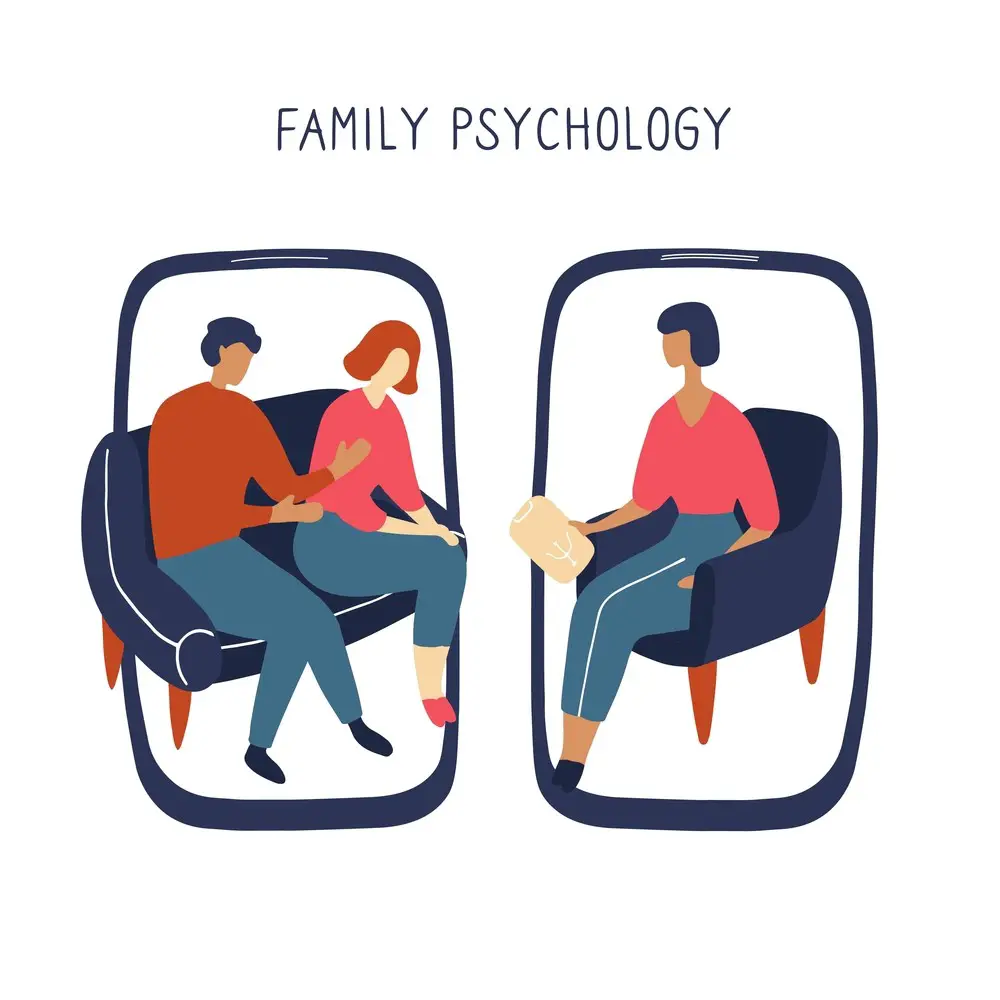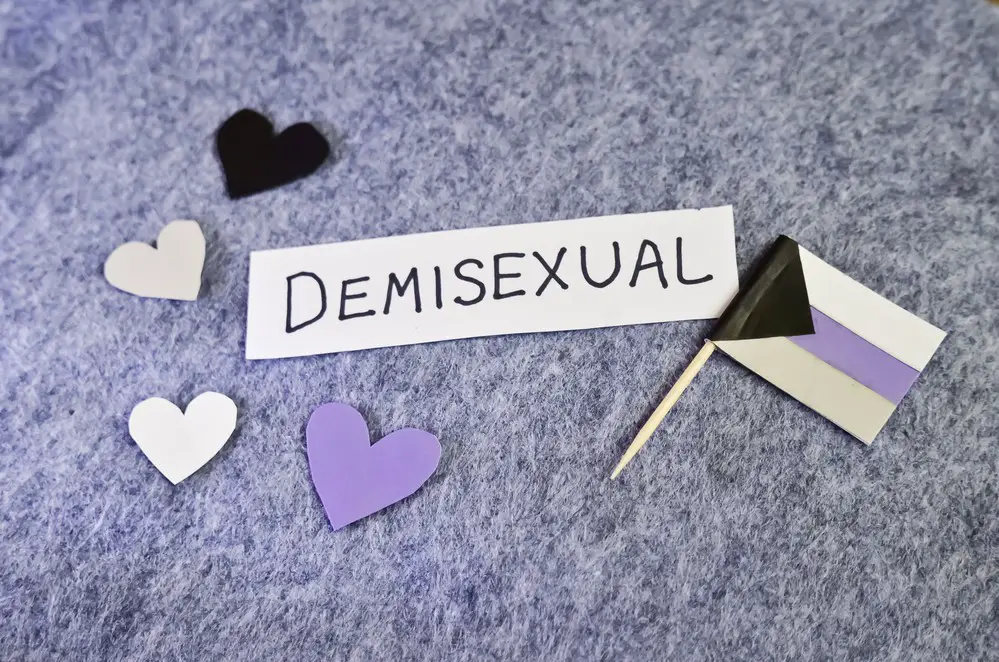As a BetterHelp affiliate, we receive compensation from BetterHelp if you purchase products or services through the links provided
Are you often curious about the concept of demisexuality and wonder if it applies to you? Demisexuality is a term used to describe people who experience sexual attraction only after they’ve formed a strong emotional bond with someone. If you’ve found yourself questioning whether you might be demisexual or not, a demisexual test might help provide some clarity.
Although no test can pinpoint your sexuality, answering questions about your experiences with attraction and relationships may help you gain insight into your feelings and preferences. By participating in these tests or quizzes, you can better understand if forming deep emotional connections is crucial for feeling sexually attracted to a partner.
Key Takeaways
- Demisexuality is about experiencing sexual attraction only after forming a strong emotional bond.
- Demisexual tests and quizzes can provide some clarity, but they cannot definitively determine one’s sexuality.
- Understanding and identifying as demisexual can help navigate the dating scene and improve relationship communication.
 Understanding Demisexuality
Understanding Demisexuality
Definition and Explanation
Demisexuality is a sexual orientation where people only experience sexual attraction when they have formed a close emotional connection with someone. This means that the initial spark of attraction may not occur for demisexual individuals until they have established a strong bond with someone.
Demisexuality on the Asexual Spectrum
Demisexuality falls under the asexual spectrum, a range of identities related to experiencing little or no sexual attraction. These identities include:
- Asexual: Little or no sexual attraction to others
- Demisexual: Sexual attraction depends on the emotional bond
- Gray-Sexual: Experiences sexual attraction occasionally or under specific circumstances.
It’s important to note that these are just some examples of identities within the asexual spectrum, and each individual’s experience and place on the spectrum may vary.
The Role of Emotional Bond
For demisexual individuals, the emotional bond plays a crucial role in their experience of attraction and relationships. Here are some key aspects of this bond:
- Demisexuals may develop romantic feelings before sexual attraction emerges.
- By establishing an emotional connection, they get to know their partner and create a sense of safety and trust.
- The bond allows for an exploration of sexuality more comfortably and genuinely.
In conclusion, understanding demisexuality includes recognizing its definition, its place on the asexual spectrum, and the important role that emotional bonds play in developing attraction and relationships.

What Does Being Demisexual Mean?
Experience of a Demisexual
Being demisexual means that you only experience sexual attraction towards someone after developing a strong emotional bond with them. It doesn’t mean you’re not open to being intimate with someone, but rather that your attraction is based on your emotional connection. If you are demisexual, you might:
- Feel little to no sexual attraction towards people you don’t know well
- Experience sexual attraction only after establishing a deep emotional bond
- Value emotional intimacy more than physical intimacy
Sexual and Romantic Attractions
Demisexuality is part of the asexual spectrum, including other orientations and identities like demiromantic and queer. Different types of attractions can be experienced by demisexual individuals, such as:
- Sexual attraction: Only experienced towards someone with a strong emotional bond
- Romantic attraction: Can be independent of sexual attraction and may occur with various partners regardless of sex or gender
It’s important to note that being demisexual doesn’t restrict your romantic orientation. You can still identify as gay, lesbian, bisexual, pansexual, or heterosexual while being demisexual.
Demisexual vs. Other Orientations
Demisexuality differs from other sexual and romantic orientations because it emphasizes emotional bonds. Comparing it with other orientations can help you understand the distinctions:
- Demisexual: Sexual attraction only experienced after a strong emotional bond is established
- Sapiosexual: Attraction based on intellectual connection rather than physical appearance
- Heterosexual: Attraction to individuals of the opposite sex or gender
- Homosexual (gay/lesbian): Attraction to individuals of the same sex or gender
- Bisexual: Attraction to individuals of both your own and other sexes or genders
- Pansexual: Attraction to individuals regardless of sex, gender, or gender identity
Recognizing and understanding your demisexual identity can help you navigate your relationships and lifestyle while staying true to your preferences and needs. Remember, everyone’s experience of sexuality and attraction is unique, and there’s no right or wrong way to identify or express your orientation.
Identifying as Demisexual
The Label and the Individual
Demisexuality is a sexual orientation where a person only feels sexually attracted to someone after forming a strong emotional bond. As an individual, it’s important to remember that everyone’s experiences vary, and your journey with the label of demisexual might be different than someone else’s. It’s crucial to acknowledge and respect the personal experiences of others when discussing or learning about sexuality – so let’s dive into some aspects of understanding demisexuality.
- Emotional connection: This is the key ingredient for a demisexual to develop a sexual attraction.
- Opposite sex or same-sex: Demisexual individuals can be sexually attracted to any gender as long as an emotional bond is formed.
Coming to terms with Identity
Accepting and embracing your demisexual identity may be a process and may take some time. Here are a few suggestions that might help you navigate this journey:
- Educate yourself: Learning about demisexuality and its various aspects will help you better understand your experiences, feelings, and desires.
- Share your thoughts: Confide in someone you trust to help you understand your identity. Discussing your feelings and experiences with a supportive friend, family member, or counselor can be invaluable.
- Join online communities: Engaging with others who identify as demisexual or similar orientations can offer valuable insights, tips, and support.
 Trust and Relationships
Trust and Relationships
Trust plays a vital role in forming strong emotional bonds, an essential aspect for demisexuals in relationships. Here are some tips to nurture trust and strengthen your relationships:
- Open communication: Be honest and transparent about your feelings, desires, boundaries, and expectations with your partner.
- Listen and empathize: Understand and validate your partner’s emotions and experiences. Be open to their perspective without judgment.
- Be patient: It might take some time for demisexual individuals to develop a sexual attraction towards a partner. Give yourself and your partner the time and space to explore and understand each other’s feelings.
- Build emotional intimacy: Share personal experiences, express your emotions, and engage in deep conversations to foster emotional closeness.
As a demisexual individual, remember that your identity and experiences are valid. Embrace and celebrate your uniqueness, and keep growing in your understanding of yourself and the relationships you form.
Demisexual Test and Quiz
Understanding the Test
Demisexual tests and quizzes can help you explore your sexuality and understand whether you might identify as a demisexual person. These tests usually consist of questions to determine your level of attraction, where you only feel sexually attracted to someone after developing a strong emotional bond with them. Remember, everyone’s experience of attraction is unique, and this test is just a tool to help you gain insights into your feelings and preferences.
Validity and Reliability
Remember that demisexual tests and quizzes are not always scientifically accurate or validated. They can provide a general idea about demisexuality based on the questions and criteria, but they might not capture all the nuances of an individual’s experience. It’s important to approach these tests with an open mind and use them as a starting point to examine your feelings about relationships and attraction.
Interpreting Results
When you take a demisexual test or quiz, the results will likely be presented in a score or category indicating how closely your responses align with demisexuality. Here are some tips to help you interpret your results:
- Stay open-minded: The results are not definitive answers about your sexuality but a starting point for introspection.
- Reflect on feelings and relationships: Consider past and current relationships and your feelings towards potential partners to understand the results better.
- Do additional research: Read more about demisexuality to comprehend your quiz results better and provide further context for your understanding of your personal experiences.
The most important aspect is to stay true to yourself and your feelings. This demisexual test or quiz can be a helpful exercise in understanding your preferences and emotions. Still, it should be used as a guide—not an absolute definition of your sexuality.
Tips for Dating a Demisexual
Communication and Understanding
When dating a demisexual, you must prioritize open communication and understanding. This means being honest about your feelings, expectations, and experiences. It’s important to discuss:
- Your understanding of demisexuality
- Emotional needs and boundaries
- The pace at which you both want the relationship to progress
Remember, every person is unique, so don’t make assumptions about what they want or need. Listening to your partner and adapting your approach will help you build a strong connection.
Building Trust and Emotional Bonds
Demisexual individuals often need to develop a deep emotional bond with someone before feeling sexually attracted to them. To successfully date a demisexual, you should focus on building trust and emotional intimacy. Here are some ways you can work on creating a strong emotional bond:
- Spend quality time together: Go for walks, converse, and share hobbies or interests.
- Be consistent and reliable: Show your partner they can depend on you.
- Share personal experiences and emotions: Open up about your life and encourage your partner to do the same.
 Creating an Emotional Relationship
Creating an Emotional Relationship
An emotional relationship is often more critical for demisexual individuals than for sexual aspects. Here are some tips to establish and maintain a strong emotional connection:
- Be patient: Building deep emotional connections may take time. Resist the urge to rush the process and allow your bond to grow naturally.
- Express love and care: Reassure your partner that you care about their feelings and well-being. Small gestures, like surprise notes and compliments, can go a long way.
- Emphasize non-sexual intimacy: Physical affection like hugging, holding hands, and cuddling can help reinforce your emotional connection.
By focusing on communication, trust, and building an emotional bond, you can create a fulfilling relationship with a demisexual partner. Remember always to be patient and understanding of their unique needs and desires.
Resources and Community Support
Online Resources
Several online resources are available to help you better understand demisexuality and connect with others who share similar experiences. Here are a few reputable websites you can explore:
- Demisexuality Resource Center: This website offers a wealth of information about demisexuality, including articles, FAQs, and personal experiences of demisexual individuals. Visit the Demisexuality Resource Center.
- Asexuality Archive: This online archive contains various educational materials on asexuality and demisexuality, catering to different learning styles with articles, presentations, and podcasts. Browse the Asexuality Archive.
Support Groups and Communities
Connecting with others who share your experiences and understand your unique perspective can be invaluable in exploring your own demisexual identity. Supportive communities are available both online and offline:
- AVEN (Asexuality Visibility and Education Network): AVEN is an inclusive online community for people on the asexuality and demisexuality spectrum. Join the conversation at AVEN’s forums.
- Reddit: There are several Reddit communities where you can discuss demisexuality, ask questions, and connect with others. Some popular subreddits include r/demisexuality and r/asexuality.
- LGBTQ Support Centers: Many LGBTQ centers offer resources and support for demisexual individuals. Contact your local LGBTQ center for information about groups and events in your area.
Educational Material
As you explore your demisexual identity, it’s important to be armed with accurate, up-to-date information. Consider the following educational resources:
- Books: Many books are available about demisexuality and related topics, such as Julie Sondra Decker’s The Invisible Orientation: An Introduction to Asexuality.
- Podcasts: Podcasts focused on asexuality and demisexuality can provide valuable insights and perspectives. Notable podcasts include A OK and Sounds Fake But Okay.
- Videos: YouTube and other video-sharing platforms feature informative and relatable videos about demisexuality, including personal stories and educational content. Check out channels like Ask An Asexual and Sexplanations.
Remember, as much as these resources are here to help you; it’s crucial to trust your feelings and experiences and be open to learning more about your unique sexuality.
 Heart Full, Mind Overflowing: Unmissable Signs It’s Time for Therapy
Heart Full, Mind Overflowing: Unmissable Signs It’s Time for Therapy
You might think of life as a complex symphony. Sometimes, all the instruments are in tune, and life flows harmoniously. But at other moments, the orchestra falls out of sync, and you’re left grappling with a cacophony of emotions and experiences that can be hard to navigate. That’s when it might be time for therapy, a sort of ‘life-tuning,’ if you will. Let’s delve into the signs that therapy isn’t just an option but perhaps a much-needed interlude.
1. Emotional Fatigue:
If you’re feeling constantly drained, like your emotional battery never gets above 20%, it might be time to seek professional guidance.
2. Irritability and Anger:
When the smallest inconveniences make you unusually angry or you find yourself snapping at people you care about, consider it a red flag.
3. Isolation Tendencies:
If you’ve started to withdraw from friends and family and prefer the solitude of your own company all too often, something’s probably up.
4. Sleep Struggles:
Whether tossing and turning all night or oversleeping, disruptions in your sleep patterns are more than just annoying—they’re a sign.
5. Lack of Focus:
When your attention span feels shorter than a goldfish’s, and you can’t concentrate on tasks, it may be time to talk it out.
6. Persistent Sadness:
If you’re perpetually caught in a rain cloud of sadness without knowing why, therapy can help you locate that elusive umbrella.
7. Excessive Worrying or Anxiety:
If your thoughts are a revolving door of “what-ifs” and worst-case scenarios, therapy can help you find your ground.
8. Inexplicable Physical Ailments:
Sometimes, emotional turmoil manifests physically. Frequent headaches or an uptick in digestive issues can be your body’s SOS signal.
9. Relationship Strains:
If the people closest to you are starting to feel like distant planets, it may be worth exploring the emotional cosmos with a therapist.
10. You Feel Stuck:
If your personal or professional life feels like a car stuck in the mud, therapy can offer you the traction to move forward.
Recognizing these signs is the first step towards better emotional and mental well-being. Getting to see a therapist is a step closer to conducting a life symphony that sounds good and feels harmonious.

Turning Life’s Sheet Music Right-Side Up: Goals of Therapy and Milestones of Progress
Therapy isn’t just about fixing what’s broken; it’s about tuning each string of your emotional guitar so that you can strum a more harmonious life melody. But how do you know if the tuning is working? Understanding the goals of therapy and the indicators of progress can be your roadmap on this healing journey.
Goals of Therapy
- Emotional Clarity: One of the fundamental goals is to sift through the emotional fog and gain a crystal-clear understanding of your feelings.
- Improved Relationships: Whether it’s a romance on the rocks or a familial feud, therapy aims to mend the torn fabrics of your relationships.
- Coping Skills: Life will always throw curveballs; therapy can teach you to catch or dodge skillfully.
- Self-Understanding: Dive into the murky waters of your subconscious to fish out the treasures of self-awareness and self-acceptance.
- Behavioral Changes: Replace detrimental habits with healthier ones that allow you to navigate life’s labyrinth with a steadier gait.
- Wellness and Balance: Ultimately, therapy aims to equip you with the tools to maintain a well-rounded emotional, physical, and mental balance.
Signs of Progress
- A Lighter Emotional Load: If you notice that the emotional backpack you’ve been carrying feels lighter, that’s a great sign you’re making strides.
- Better Interpersonal Dynamics: When conversations with loved ones start feeling less like minefields and more like dialogues, pat yourself on the back.
- Enhanced Resilience: If you’re bouncing back from setbacks faster and with less emotional scarring, that’s an ‘A+’ in the resilience test.
- Greater Self-Confidence: If you’re standing taller and feeling more secure in who you are, that’s a sign your therapy sessions are paying off.
- Mindfulness and Presence: You’re progressing well when you find yourself more in ‘the now,’ instead of ruminating over the past or fearing the future.
- Consistent Mood: Less mood swings and a more stable emotional climate mean you’re on the right track.
- Action Over Inertia: If you’re moving from planning to doing, that’s a signal you’re turning goals into actions—a clear sign of progress.
- Shift in Perspective: When problems start looking more like challenges to overcome rather than burdens to bear, you know you’re gaining ground.
You can better evaluate your therapy journey by understanding these goals and recognizing these signs. It allows you to align your expectations and savor the victories, no matter how small. Remember, therapy is not a sprint; it’s a marathon where every step forward is a win in its own right.
Frequently Asked Questions
How can I determine if I’m demisexual?
To determine if you’re demisexual, consider if you typically only experience sexual attraction to someone after forming a strong emotional bond with them. There is no definitive test, but self-reflection and answering quiz questions, like those found on sites like wikiHow or Quizondo, may help you understand your tendencies better. Remember that only you can define your sexual orientation based on your experiences.
What are the key signs of demisexuality?
Some key signs of demisexuality include:
- Rarely feeling sexual attraction to others
- Only experiencing sexual attraction after forming deep emotional connections
- Frequently developing attractions to friends
- Preferring slow, emotionally-developed relationships
- Feeling little to no interest in casual sexual encounters
Is there a difference between demisexuality and graysexuality?
Yes, demisexuality and gray sexuality are separate concepts, yet both fall within the asexual spectrum. Demisexuality entails feeling sexual attraction only after forming an emotional connection, while gray sexuality refers to experiencing sexual attraction infrequently or in specific circumstances that don’t necessarily require an emotional bond.
How do demisexuals approach relationships?
Demisexuals often approach relationships differently from others because they prioritize emotional connection over sexual attraction. They typically prefer getting to know potential partners well, developing friendships first, and letting relationships evolve naturally. Demisexuals often value trust, emotional intimacy, and communication above physical attraction.
Can demisexuals experience romantic love?
Yes, demisexuals can experience romantic love. They are just as capable of forming strong emotional bonds and loving connections as anyone else. Demisexuality only refers to the way sexual attraction manifests, not to one’s ability to feel love or experience romantic emotions.
How does demisexuality impact attraction?
Demisexuality impacts attraction by limiting sexual attraction to when a strong emotional bond has been formed. It doesn’t mean that demisexuals lack attraction altogether. Instead, they often experience other forms of attraction, such as romantic, emotional, or aesthetic, more prominently and independently of sexual attraction.
 Jacob Maslow: The Emotional Cartographer Plotting Pathways Through Mental Mazes
Jacob Maslow: The Emotional Cartographer Plotting Pathways Through Mental Mazes
Hey there! I’m Jacob Maslow, and if you’re wandering through the labyrinthine corridors of mental health, relationships, and legality, you’ve come to the right place. I’m no stranger to life’s curveballs; I’ve been taking Lexapro for years to manage my mental health and consider myself a therapy veteran.
Navigating a life complicated by a tumultuous relationship with my ex, who suffers from severe narcissism, has been nothing short of a rollercoaster. Years after our divorce, she chose to alienate our children and flout court-ordered shared custody arrangements. The ongoing legal battle has been draining. But let’s rewind a bit; there was a time when she and I maintained a relatively close relationship, raising our children in two separate but loving households.
I take long walks every day to clear my head amid this storm. Each step is like a mini-meditation, letting me refocus and recalibrate.
I channel my challenges into helping others and write extensively about mental health and narcissism. Through my words, I aim to throw a lifeline to those grappling with similar issues, making it clear that overcoming mental health hurdles is not just a possibility but a probability.
But that’s not all. I also run a legal site offering guidance for others ensnared in the quagmire of a spouse who refuses to comply with court orders. I’ve become adept at transforming personal struggle into collective empowerment.
If my experiences have taught me anything, it’s that anyone can beat their mental health issues and that navigating complex relationships, while challenging, can become manageable with the right tools and mindset.
So join me if you seek mental clarity, relational peace, or legal guidance. We’ve got some ground to cover, and I’m here to walk you through it.
- 7 Ideas to Help You Relax and Unwind on a Family Vacation - April 27, 2025
- How Having Cybersecurity Protection Helps You Relax - April 25, 2025
- 8 Reasons Why Spending Time Outside Calms You Down - April 25, 2025
This site contains affiliate links to products. We will receive a commission for purchases made through these links.


 Understanding Demisexuality
Understanding Demisexuality Trust and Relationships
Trust and Relationships Creating an Emotional Relationship
Creating an Emotional Relationship Heart Full, Mind Overflowing: Unmissable Signs It’s Time for Therapy
Heart Full, Mind Overflowing: Unmissable Signs It’s Time for Therapy Jacob Maslow: The Emotional Cartographer Plotting Pathways Through Mental Mazes
Jacob Maslow: The Emotional Cartographer Plotting Pathways Through Mental Mazes
